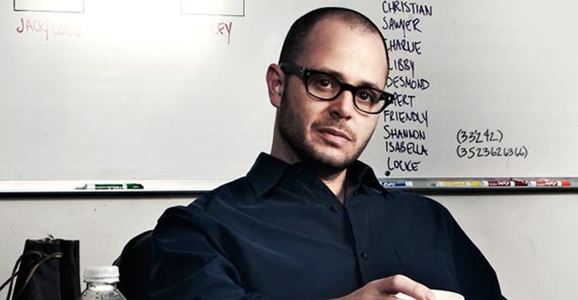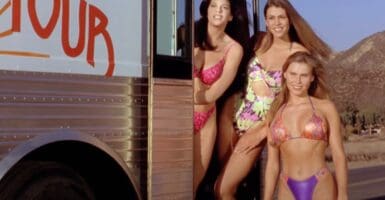Damon Lindelof Talks Star Trek Into Darkness, World War Z, And The Perils Of Hollywood Blockbusters
This article is more than 2 years old
 Next to J.J. Abrams and Michael Bay, he’s one of the most polarizing names in showbusiness right now. Over the past decade, Damon Lindelof’s fingerprints have been on some of the most high-profile genre projects out there. Lost. Prometheus. Star Trek Into Darkness. World War Z. Love him or hate him — just like Abrams — he isn’t going anywhere anytime soon. In a sprawling new interview, Lindelof is candid not just about the challenges of penning new additions to such iconic fictional worlds as Trek and Alien, but about the diminishing returns of navigating a studio system that demands ever-escalating odds for its summer blockbusters.
Next to J.J. Abrams and Michael Bay, he’s one of the most polarizing names in showbusiness right now. Over the past decade, Damon Lindelof’s fingerprints have been on some of the most high-profile genre projects out there. Lost. Prometheus. Star Trek Into Darkness. World War Z. Love him or hate him — just like Abrams — he isn’t going anywhere anytime soon. In a sprawling new interview, Lindelof is candid not just about the challenges of penning new additions to such iconic fictional worlds as Trek and Alien, but about the diminishing returns of navigating a studio system that demands ever-escalating odds for its summer blockbusters.
Speaking to Vulture, Lindelof bemoans a Hollywood screenwriting process that insists on continually ramping up both the stakes and the action, resulting in what has been referred to this past summer movie season as “apocalypse fatigue.” How many times can you watch the world saved or destroyed before you start craving a story that’s just about people? Hell, Steven Spielberg himself recently predicted that Hollywood’s ever-bigger, ever-more-expensive movies were headed for an “implosion.” The box office returns of flicks such as The Lone Ranger, White House Down, and R.I.P.D. show it’s happening as we speak.
Lindelof says the inherent demand to out-epic the competition limits what can be done with a high-dollar Hollywood blockbuster:
It’s almost impossible to, for example, not have a final set piece where the fate of the free world is at stake. You basically work your way backward and say, ‘Well, the Avengers aren’t going to save Guam, they’ve got to save the world.’ Did Star Trek Into Darkness need to have a gigantic starship crashing into San Francisco? I’ll never know. But it sure felt like it did.
Lindelof co-wrote this summer’s Star Trek Into Darkness with Roberto Orci and Alex Kurtzman, and while I personally thought it was a huge improvement over J.J. Abrams’ initial reboot film, it’s still a massive target for fanboy rage, not least for having the audacity to put its own spin on the tale of Khan (Benedict Cumberbatch). Fans can (and will continue to) argue for years about whether they should have used Khan, but once they made that decision, it became a question of what to do with him. And once you start down that road, trying to top Wrath of Khan is pointless, so how do you find a different ending (albeit with plenty of major nods or rip-offs, depending on your point of view).
In a world of ridiculously massive movie finales, the plan was always to contrast that with the smaller conflict of the face off between Spock and Khan. But the ending still went through a phase where there was another over-the-top element in the mix. Lindelof reveals that early versions of the script had a hostile Klingon fleet on its way to Earth. Uhura’s diplomacy would have once again saved the day, but Lindelof says, “We dropped it pretty early on, as it didn’t feel intimate, cool, or earned.”
Lindelof was also one of the many writers on this summer’s surprise hit World War Z. Specifically, he was brought in to help reconceive the third act and conclusion. As we’ve reported before, the ending at one point involved an over-the-top and tonally jarring battle in Red Square, where Brad Pitt’s U.N. character was helping lead the attack. Lindelof doesn’t blame screenwriter Matthew Michael Carnahan (State of Play) for the atonal mess he inherited, however.
I can honestly tell you that, I think, if [screenwriter] Drew [Goddard] and I had been hired to write the first draft of World War Z, if we had had Matthew Michael Carnahan’s job, we would have written exactly the same movie that Carnahan did, with the same third act. We were able to come in and say, ‘Let’s scale it down, let’s make it the intimate zombie experience’ only because they’d shot the other version and it didn’t work.
As those who saw the movie recall, the film’s final ending instead unfolded in a zombie-overrun lab where Pitt’s character and other scientists must sneak around to discover and test a potential cure for the plague. It was very counterintuitive to a typical blockbuster climax, and whatever the film’s other problems, the new ending worked fairly well.
Whether you think Lindelof is a decent writer or a total hack, the full interview is definitely worth reading. If nothing else, it’s a depressing look at the ass-backwards way Hollywood crafts blockbusters, and a revealing insight into why so many of them fail.












